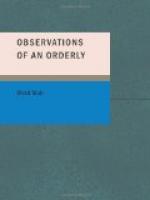“Another convoy expected at 6.15? Twenty walking-cases and seventeen cots. Right you are!”
And at 6.15 the party of orderlies will be back again at the front door, again the motor-cars will stream up the drive, again the ambulances will come with their stretchers, and again the receiving hall will awaken from its interlude of silence to echo with the activities incidental to a clearing house of those damaged human bundles which are the raison d’etre of our great war-hospital.
VII
“T.... A....”
War-hospital patients are of many sorts. It is a common mistake of the arm-chair newspaper devourer to lump all soldiers together as quaint, bibulous, aitch-dropping innocents, lamblike and gauche in drawing-rooms, fierce and picturesque on the field, who (to judge by their published photographs) are continually on the grin and continually shaking hands either with each other or with equally grinsome French peasant women at cottage doors or with the local mayor who congratulates them on the glorious V.C.’s which, of course, they are continually winning. In a war hospital that harbours many thousands of patients per annum, we should know, in the long run, something about the characteristics of Tommy Atkins; and it is with resentment that I hear him thus classified as a mere type. He is not a type. Discipline and training have given him some veneer of generalised similarities. Beneath these, Tommy Atkins is simply the man in the street—any man in any street; and if you look out of your window in the city and see a throng of pedestrians upon the pavement you might just as well say that because they are all civilians they are all alike as that, because all soldiers wear khaki, they are all alike.
I have a quarrel with the Press on the score of its persistent fostering of this notion that “our gallant lads” (as the sentimental scribe calls them) are a pack of children about whose exploits an unfailing stream of semi-pathetic, semi-humorous anecdotes must be put forth. Even the old professional army exhibited no dead level either of blackguards on the one hand or humble Galahads on the other. But whatever may have been the case before the war, all the armies of Europe are now alike in this, that they are composed of civilians who merely happen to




